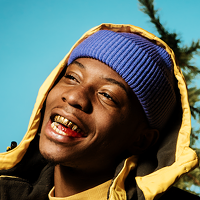A crowd of 80 might not look like much in a 240,000-square-foot warehouse, but to the photographers, models and other creatives who gathered at Camp North End on Sunday, December 17, it was everything.
The group had convened on the sprawling north Charlotte campus for a "photo walk," an event hosted by local photographer Carey J. King and a few of his friends in the hopes of bridging some of the gaps in Charlotte's photography community by helping artists and other creatives connect.
Entering the warehouse at around 2 p.m., local photographer McKenna Hudson stood in the doorway, shooting a model in a black shirt, translucent except across the chest, where the word "Savage" made a strong statement alongside her Dreamcatcher earrings and a strip of golden make-up under her eyes reminiscent of war paint.
As Hudson shot, other photographers came and went, taking their own pictures. They discussed how the light was perfect in the doorway at just that moment.
Inside, Jimi Thompson, aka Dammit Wesley, blasted music from a DJ booth set up near the center of the cavernous building. Models posed informally along the wall while photographers gathered around. Some models stood under lights and fog machines, while others simply leaned on stools wherever the natural light fell.
For local photographer Glenn Byrd, Jr., it was the perfect scenario.
"It's like a photography and model orgy in here," Byrd said, laughing. "It's like, you just walk up to somebody; you don't have to worry about being awkward, because everyone here understands, it's dope."
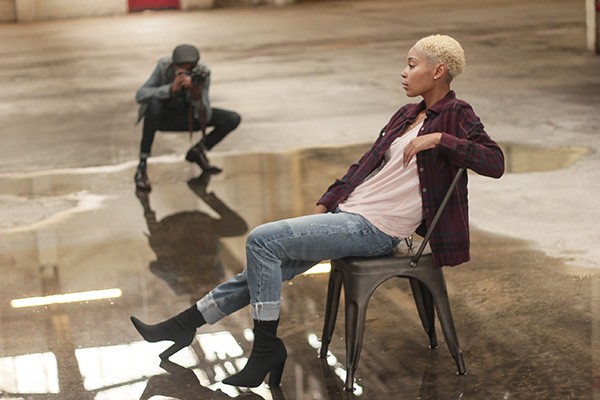
- Joshua Galloway shoots Kotah Carter at the photo walk. (Photo by Carey J. King)
Sunday's event was the realization of a vision King has been working on for much of 2017, since his birthday in March, when he held his first photo walk.
That event was attended mostly by King's friends. It wasn't until a trip to New York City in April — during which he attended art shows and photography events — that he became aware of what Charlotte's scene should and could look like.
"It was more of a community [in New York]," King said. "People are like, 'Hey, I know this person, could you fill in for this job?' That type of thing. They're more like a family there, and I want to have the same thing here."
The New York trip made King rethink his photo walks as an opportunity to bring Charlotte photographers together and begin building the sense of community he felt up north.
"Not just in the photography community but in the artist community in general, [Charlotte] can become very cliquey and there's no line of communication amongst artists," King said.
"I don't really have a set clique, I just kind of bounce from group to group," Kind said. "And I found that I can bring those people together with the photo walks and get them to talk, because otherwise they probably wouldn't reach out to each other."
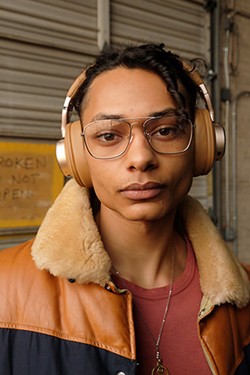
- Demetrius McKenney. (Photo by Carey J. King)
King hosted his second photo walk in South End shortly after his return to Charlotte, but the turnout still wasn't what he had hoped for, so he started reaching out to collaborators.
Over the summer, Thompson and Will Jenkins had opened an interactive arts studio called Black Market in Camp North End, so he suggested they hold an event there. In November, about 100 people attended the first photo walk at the old army missile plant.
It was an amazing change for Jenkins, who's been to every one of King's previous walks. On Sunday, Jankins was enthralled by the number of new people to show up.
"Initially, the first ones that we did, we generally all knew each other," Jenkins recalled while standing outside at Camp North End on Sunday. "Out here, I can say that I don't know 75 percent of these people, but I'm getting to know them and every so often we build relationships. Hopefully one day we'll have an event and I'll see all these same people over here at the same time, but for a show, not a photo walk."
As a student at Northwest School of the Arts, King wouldn't have imagined he would be the one leading the charge to connect Charlotte's photography scene. Throughout his childhood it was music and not the visual arts that interested King.
When the Charlotte native graduated from high school, he had 10 years of classical voice training and no intention of using it.
"I didn't really want to do anything with that so I picked up a camera," King said.
For a couple of years, he didn't take photography seriously, until something happened that would change his life.
A couple months after King's 21st birthday, he lost his grandfather, who had raised him from a boy. It was King's first experience with the death of a loved one, and from then on, he noticed a difference in the way he viewed the world.
"It changed my outlook on life. I started looking at things differently," King said. "I started noticing little details that I would normally pass over. And with that newfound sight, I decided to pick up a camera and I started taking pictures just to show people how I now see things."
Whether shooting portraits or city lights, King's work carries a certain poignancy. He still likes to focus on the small things, but even when he zooms out, the subtlety remains.
Considering how he got his start, it's not surprising that King describes his style as an "emotion" photographer.
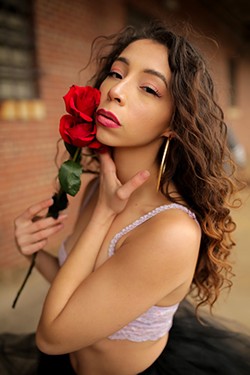
- Zander Johnson. (Photo by Carey J. King)
"My approach to photography is really all about emotions, like taking anything that I'm looking at and putting an emotion behind it or telling a story with anything that I take pictures of," he said.
Over the last year, King has started to see his work pay off. In July, he held his first gallery show at Magnolia Emporium as part of the popular Historic South End Gallery Crawl.
Not just friends, but many of King's former teachers from Northwest showed up. The experience was the confidence boost that King needed to take his photo walks to the next level.
"It pushed me to really do bigger things, now that I know I'm able to draw a crowd," he said.
And a crowd he certainly drew at Camp North End on Sunday.
Byrd, speaking inside the warehouse while he looked on at his fellow photographers, echoed King's sentiments regarding the tendency for Queen City photogs to stay within their circles. He said he's already seen that the photo walks have had an effect on that mentality.
"Charlotte is very cliquey, so anything that breaks up that cliquey BS, I'm down for it," Byrd said. "Let's get together. Nobody's really making money off of this shit, but it's cool when you just say, 'Let's do it for the fun of it.'
"All the other major cities do that," he said. "I'm from New York, I've lived in Toronto, they both do the same thing. So why not here?"
While the photo walks may not be money-making opportunities, the networking can set someone up for future gigs. King wants to see it to get to a point where there's an entire network of local photographers and local models helping each other find work, or finding replacements for jobs they can't do themselves.
David Butler, another local photographer who attended the Sunday event, says the photo walks are also a good way to help people break onto the scene without having to take classes or know the right people.
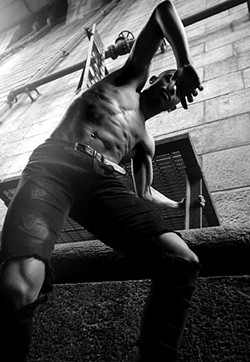
- Roderick Phifer. (Photo by Carey J. King)
"Charlotte is still very young and very open. It's a completely open market for a lot of different things, so it's like a confidence builder, too," Butler said.
"You don't have to feel the pressure of being on a shoot with a client for the first time," Butler added. "You can come to a couple photo walks and get your feet wet and figure out how those things work for you, specifically. I think it's a good opportunity for people who are just entering the sphere to get their feet wet and be around other creatives and pick up tips and tricks from the people who have been doing it for a while."
It's hard to say how many people were in and out of the photo walk on Sunday during the event's four-hour span, but the crowd consistently stayed between 80 and 90 at any given time throughout the afternoon. After folks had shot all they could see in the warehouse, the group began to walk across a parking lot to the other side of yet another massive old building on the campus.
The large group made its way down a walkway that ran parallel to some old train tracks. Every once in a while, a photographer and model would jump down into the long grass and shoot along the tracks.
Eventually, Hudson, who had been shooting in the doorway earlier in the afternoon, came running up behind the group laughing but looking a little bewildered. Her car was blocked in, she said, and the crowd was too big and spread out for her to easily figure out who could help her.
While she was stuck, Hudson spoke about her experience at the photo walks, as she had attended all four.
"I think it's the best way to bring the photography community together, because we all see each other on social media but we don't necessarily see each other in real life," she said, having given up on finding out who was keeping her hostage at Camp North End indefinitely.
"This is like my favorite thing to do in the city," she said. As she spoke, Hudson looked happily resigned to the fact that if there's any place for a photographer to be stuck on a Sunday afternoon, she was there.
Video recap by Andrew Kiefer.

